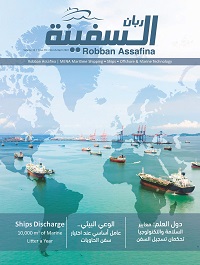Women ride the waves of technology to maritime advancement
As the global maritime industry celebrates the first annual International Day for Women In Maritime, IEC Telecom highlights the role technology is playing in helping women to advance their careers in this diverse industry
Women have actually been working in maritime roles for hundreds of years but their nautical history is not well known. Today, however, women’s place within this important industry is being brought to increasing notice with numerous workplace initiatives designed to highlight the many and varied opportunities available and to help female workers gain the skills and experience needed for career advancement.
Diversity and digitalisation go hand-in-hand. The digital revolution which is progressing throughout today’s shipping industry is enabling more and more processes to be automated, meaning they can be carried out from the shore. This opens the door to more women who want to work in the maritime sector but are perhaps deterred by the prospect of spending many months away at sea.
Presently the maritime industry has one of the largest gender pay gaps, according to a recent report by Ocean Infinity, with women earning on average 43% less than men (in the UK). One of the main driving factors for this huge gap is that fact that 95% of all administrative roles in maritime are occupied by women, compared to just 5% of executive leadership team roles. The flip-side of this coin is that the skills utilised for desk-based positions are becoming increasing valuable.
Shore-based roles afford women even greater opportunities than traditional seagoing positions such as engineering because these skills can be learned and adopted more quickly. So modern maritime abilities such as blockchain transactions, processing big data, and operating computer-bases systems and artificial intelligence will give women in maritime even greater opportunities and career possibilities.
At the same time, increasing numbers of women are joining the seafaring ranks. The latest BIMCO/ICS Seafarer Workforce Report 2021 made positive reading for gender diversity within the maritime sector, reporting that the number of female STCW-certified seafarers has almost doubled since the last report in 2016 and now sits at an estimated 24,059 worldwide. While this is still only a small percentage of the global seafarer pool, it is no longer impossible for them to enter the shipping industry and succeed at sea.
Technology is playing its part in supporting women at sea. Satellite communications have made it possible to easily keep in touch with home and family in real-time and, post-pandemic, many shipping companies now provide free or low-cost internet and voice calls to crew members.

Anastasia Kuzmenko, VP of Marketing & Communication at IEC Telecom Group
“Digital solutions onboard ships now enable online learning at a time convenient to the seafarer, thereby enhancing opportunities for career development,” explained Anastasia Kuzmenko, VP of Marketing & Communication at IEC Telecom Group, a leading international satellite service operator. “Mentoring can be provided through one-to-one communication or via class-based meetings or teamwork thanks to new videoconferencing applications which have been specially designed to operate in low bandwidth environments, enabling seafarers – both female and male – to feel more supported in this challenging working environment.
She continued: “Recognising the importance, of connectivity onboard, IEC Telecom dedicated the past five years to the development of solutions enabling digitalisation on vessels of all types. Thus, comprehensive training and crew welfare programs, previously reserved for large VSAT-equipped vessels, are now accessible on small and mid-sized boats limited to the L-band network. New technologies are helping to improve working conditions and create new job opportunities across all sectors of the maritime industry, which is encouraging women to join the ranks of seafarers.”
Over recent years the International Maritime Organisation (IMO) and other global organisations have given high-level support to campaigns aimed at encouraging more women into the maritime industry. One of the key goals of the International Day for Women In Maritime is to show a more diverse representation of maritime careers, so that roles such as captain, chief engineer and seafarer are also portrayed by women. The IMO believes this is vital in inspiring young women to embark on a maritime career, by showing there is a place for them in the maritime sector.
With today’s corporate environment evolving to meet environmental, social and governance (ESG) goals, corporate culture is changing and women are being promoted to senior positions and Board roles within forward-thinking companies. The Women’s International Shipping & Trading Association (WISTA), reports that its 3,000 members in 45 countries represent almost all facets of the shipping industry, including ship owners and ship operators, mariners, logistics and port executives, maritime technology experts, legal and finance professionals, engineers, academics, service providers, suppliers, and government employees. It points out that there are many studies that show that having women in senior positions in any business promotes stability and profitability and provides a competitive advantage over other companies that are not gender diverse.
The UAE is embracing gender diversity in the workplace, including the maritime industry. The Arab Women in Maritime Association (AWiMA), provides a platform to bring together women working in the maritime industry in the region, with a vision that aims to produce “an effective Arab woman who promotes a strong maritime sector.” Meanwhile almost 43% of students at The Arab Academy for Science, Technology and Maritime Transport Branch in Sharjah are women – the highest percentage of female maritime students in the MENA region. And Saudi Arabia is addressing diversity issues as part of its actions to achieve its ambitious Vision 2030, which envisages increasing the participation of women in the workforce from the present 22 percent to 30 percent.
Anastasia Kuzmenko, concluded: “This is an exciting time to be a woman in the maritime industry. We are at the vanguard, breaking new ground and advancing at digital speed. The launch of the International Day for Women In Maritime is a useful way to highlight our successes to other women who may be considering a career in maritime. The door is open – we encourage you to come on in!”
| Read Here | |
 |
|








































